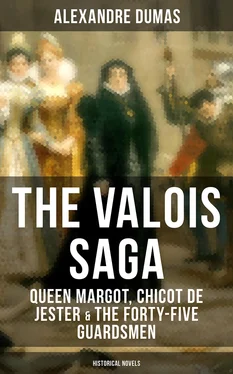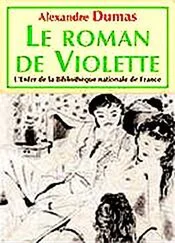“Have no anxiety, my dear aunt. I honor you more than I do the Pope, and I love my sister more than I fear him. I am not a Huguenot, neither am I a blockhead; and if the Pope makes a fool of himself, I will myself take Margot by the hand, and have her married to your son in some Protestant meeting-house!”
This speech was soon spread from the Louvre through the city, and, while it greatly rejoiced the Huguenots, had given the Catholics something to think about; they asked one another, in a whisper, if the King was really betraying them or was only playing a comedy which some fine morning or evening might have an unexpected ending.
Charles IX.‘s conduct toward Admiral de Coligny, who for five or six years had been so bitterly opposed to the King, appeared particularly inexplicable; after having put on his head a price of a hundred and fifty thousand golden crowns, the King now swore by him, called him his father, and declared openly that he should in future confide the conduct of the war to him alone. To such a pitch was this carried that Catharine de Médicis herself, who until then had controlled the young prince’s actions, will, and even desires, seemed to be growing really uneasy, and not without reason; for, in a moment of confidence, Charles IX. had said to the admiral, in reference to the war in Flanders,
“My father, there is one other thing against which we must be on our guard — that is, that the queen, my mother, who likes to poke her nose everywhere, as you well know, shall learn nothing of this undertaking; we must keep it so quiet that she will not have a suspicion of it, or being such a mischief-maker as I know she is, she would spoil all.”
Now, wise and experienced as he was, Coligny had not been able to keep such an absolute secret; and, though he had come to Paris with great suspicions, and albeit at his departure from Chatillon a peasant woman had thrown herself at his feet, crying, “Ah! sir, our good master, do not go to Paris, for if you do, you will die — you and all who are with you!”— these suspicions were gradually lulled in his heart, and so it was with Téligny, his son-inlaw, to whom the King was especially kind and attentive, calling him his brother, as he called the admiral his father, and addressing him with the familiar “thou,” as he did his best friends.
The Huguenots, excepting some few morose and suspicious spirits, were therefore completely reassured. The death of the Queen of Navarre passed as having been caused by pleurisy, and the spacious apartments of the Louvre were filled with all those gallant Protestants to whom the marriage of their young chief, Henry, promised an unexpected return of good fortune. Admiral Coligny, La Rochefoucault, the young Prince de Condé, Téligny — in short, all the leaders of the party — were triumphant when they saw so powerful at the Louvre and so welcome in Paris those whom, three months before, King Charles and Queen Catharine would have hanged on gibbets higher than those of assassins.
The Maréchal de Montmorency was the only one who was missing among all his brothers, for no promise could move him, no specious appearances deceive him, and he remained secluded in his château de l’Isle Adam, offering as his excuse for not appearing the grief which he still felt for his father, the Constable Anne de Montmorency, who had been killed at the battle of Saint Denis by a pistol-shot fired by Robert Stuart. But as this had taken place more than three years before, and as sensitiveness was a virtue little practised at that time, this unduly protracted mourning was interpreted just as people cared to interpret it.
However, everything seemed to show that the Maréchal de Montmorency was mistaken. The King, the Queen, the Duc d’Anjou, and the Duc d’Alençon did the honors of the royal festival with all courtesy and kindness.
The Duc d’Anjou received from the Huguenots themselves well-deserved compliments on the two battles of Jarnac and Montcontour, which he had gained before he was eighteen years of age, more precocious in that than either Cæsar or Alexander, to whom they compared him, of course placing the conquerors of Pharsalia and the Issus as inferior to the living prince. The Duc d’Alençon looked on, with his bland, false smile, while Queen Catharine, radiant with joy and overflowing with honeyed phrases, congratulated Prince Henry de Condé on his recent marriage with Marie de Clèves; even the Messieurs de Guise themselves smiled on the formidable enemies of their house, and the Duc de Mayenne discoursed with M. de Tavannes and the admiral on the impending war, which was now more than ever threatened against Philippe II.
In the midst of these groups a young man of about nineteen years of age was walking to and fro, his head a little on one side, his ear open to all that was said. He had a keen eye, black hair cut very close, thick eyebrows, a nose hooked like an eagle’s, a sneering smile, and a growing mustache and beard. This young man, who by his reckless daring had first attracted attention at the battle of Arnay-le-Duc and was the recipient of numberless compliments, was the dearly beloved pupil of Coligny and the hero of the day. Three months before — that is to say, when his mother was still living — he was called the Prince de Béarn, now he was called the King of Navarre, afterwards he was known as Henry IV.
From time to time a swift and gloomy cloud passed over his brow; unquestionably it was at the thought that scarce had two months elapsed since his mother’s death, and he, less than any one, doubted that she had been poisoned. But the cloud was transitory, and disappeared like a fleeting shadow, for they who spoke to him, they who congratulated him, they who elbowed him, were the very ones who had assassinated the brave Jeanne d’Albret.
Some paces distant from the King of Navarre, almost as pensive, almost as gloomy as the king pretended to be joyous and open-hearted, was the young Duc de Guise, conversing with Téligny. More fortunate than the Béarnais, at two-and-twenty he had almost attained the reputation of his father, François, the great Duc de Guise. He was an elegant gentleman, very tall, with a noble and haughty look, and gifted with that natural majesty which caused it to be said that in comparison with him other princes seemed to belong to the people. Young as he was, the Catholics looked up to him as the chief of their party, as the Huguenots saw theirs in Henry of Navarre, whose portrait we have just drawn. At first he had borne the title of Prince de Joinville, and at the siege of Orléans had fought his first battle under his father, who died in his arms, denouncing Admiral Coligny as his assassin. The young duke then, like Hannibal, took a solemn oath to avenge his father’s death on the admiral and his family, and to pursue the foes to his religion without truce or respite, promising God to be his destroying angel on earth until the last heretic should be exterminated. So with deep astonishment the people saw this prince, usually so faithful to his word, offering his hand to those whom he had sworn to hold as his eternal enemies, and talking familiarly with the son-inlaw of the man whose death he had promised to his dying father.
But as we have said, this was an evening of astonishments.
Indeed, an observer privileged to be present at this festival, endowed with the knowledge of the future which is fortunately hidden from men, and with that power of reading men’s hearts which unfortunately belongs only to God, would have certainly enjoyed the strangest spectacle to be found in all the annals of the melancholy human comedy.
But this observer who was absent from the inner courts of the Louvre was to be found in the streets gazing with flashing eyes and breaking out into loud threats; this observer was the people, who, with its marvellous instinct made keener by hatred, watched from afar the shadows of its implacable enemies and translated the impressions they made with as great clearness as an inquisitive person can do before the windows of a hermetically sealed ball-room. The music intoxicates and governs the dancers, but the inquisitive person sees only the movement and laughs at the puppet jumping about without reason, because the inquisitive person hears no music.
Читать дальше












